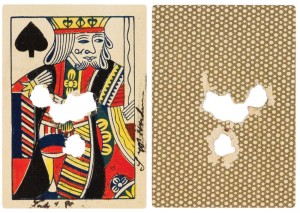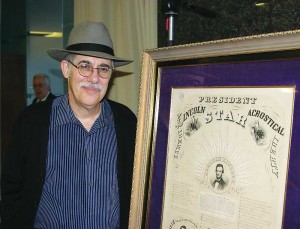For two decades Barker was a visitor at the Dow gallery, usually to pick Don Dow’s brain about something or other. Barker, an author as well as a historian, is interested in early local artists, and he gleaned much information during their long discussions.

“Don loved to talk and tell stories,” Barker said. “His family had been in the art business in Fort Worth since 1935, and he had more than a passing association with almost every artist in town. They come to Dow to get framing done or to buy supplies. Almost any of the names you could throw out from the 1940s on, Don knew them all.”
After his dad died, Greg contacted Barker and proposed they go through all of the collections, archive them, and prepare them for auction. Dow had stored his artifacts at his Fort Worth home, but Greg sold the house after his dad died (his mother, now 86, is in a nursing home). Greg moved the collections to the gallery and stuffed them in a room adjacent to the showroom. Barker quit his job at a motorcycle parts distribution shop and hired on full time with the gallery to sort out the contents of that room.
“The collection was packed into a long, narrow room that we called the Lincoln Room,” Barker said. “Framed items were stacked up everywhere. The boxes were full of stuff. We would unload the boxes one at a time and literally sort through every single thing to understand what it was.”
Dow had no system of cataloging –– no file cabinets, folders, or inventory sheets. Just hundreds upon hundreds of mostly fragile paper items packed in boxes, although many were placed into plastic sleeves for protection.
Barker organized the material by categories: Lincoln stuff here, Civil War items there, and so on. Then he began detailing individual items.
Dow left notes describing some things, but even those annotations could be confusing. A note might be located in one box, while the item it described was in another.
“There was a giant logistical problem of matching things up,” Barker said. “You might have a four-page letter, and all four pages are in different boxes. It may take months to understand that this part of the letter belongs with that part of the letter.”

Barker has organized many art shows over the years, and soon the Lincoln Room began to resemble one. Much of the collection was kept out in the open during the archival process, and Greg and Barker enjoyed showing it off to friends. Photos, paintings, and other items hung floor to ceiling.
“People would walk in, and their mouths would fall open,” Barker said. “They’d never seen anything quite like this. You almost felt like Lincoln was there with you. There were so many images of him and so many artifacts from his life that you kind of physically felt him in the room.”
Lincoln’s assassination wasn’t the only one that fascinated Dow. The gallery owner had shaken hands with John F. Kennedy outside of Hotel Texas on the day he was assassinated in 1963. Dow would eventually create collections linked to Kennedy and assassinated presidents James Garfield and William McKinley.
Still, none inspired Dow as much as Lincoln. What was it about Honest Abe that stirred such devotion?
Greg thought a few seconds. “Lincoln’s determination to stop the war and reunite the North and South was the main interest,” he said. “That and Lincoln’s high level of intelligence with only a few years of schooling. Lincoln read everything he could get hold of and was without a doubt one of our most intelligent presidents. He was in turmoil the whole time he was in office. He was elected in March, the war started in April, and it ended on April 9, 1865 –– he was shot five days later.”
Dow’s fascination is understandable. The story of a self-made man who succeeds through hard work describes Dow’s father, Percy, the man who founded the gallery. And in some respects, it describes Don Dow himself.
******












Just noticed this really great story about Mr. Dow. Thanks for bringing it to our attention. He was my friend for many years, but you told me things I didn’t know. Informative and entertaining. I have shared this article with dozens of art collectors in Texas and they have all thanked me for doing so. Keep up the good work.